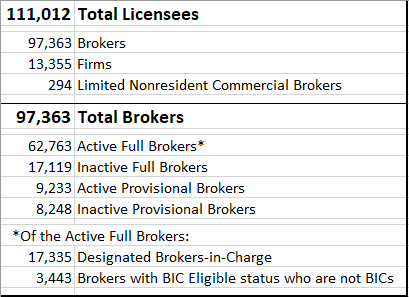Bulletin Search
My license expired. How do I reinstate it?
To maintain a current license, brokers must renew their license annually between May 15 and June 30. The license of a broker who fails to renew during that period will expire on June 30, and that broker must cease all brokerage activities immediately.
What steps must a broker take to reinstate an expired license? That answer depends on how long the license has been expired.
To reinstate a license expired for less than 6 months:
- go to the Commission’s homepage (www.ncrec.gov);
- click on Reinstate your License;
- enter your license number and PIN (last 4 of your SSN unless you have changed it);
- answer required questions; and
- pay $90 reinstatement fee.
NOTE: To regain active status, a License Activation / Affiliation form (REC 2.08) also must be submitted.
To reinstate a license expired for 6 months but no more than 2 years:
- Successfully complete one 30-hour Postlicensing course (course must be completed within 6 months prior to submitting reinstatement application); and
- Submit a reinstatement application with $90 application fee and all required documentation, including criminal background report;
-OR-
- Submit a reinstatement application with $90 application fee and all required documentation, including criminal background report; and
- Pass National and State sections of license exam.
NOTE: To regain active status, a License Activation / Affiliation form (REC 2.08) also must be submitted.
To reinstate a license expired for more than 2 years:
- Successfully complete the 75-hour NC Broker Prelicensing course;
- Submit a license application with $100 original application fee and all required documentation, including criminal background report; and
- Pass National and State sections of license exam.
NOTE: You will be licensed as a provisional broker and be subject to the 90-hour Postlicensing education program. To gain active status, a License Activation / Affiliation form (REC 2.08) also must be submitted.
For more information, review Commission Rule 58A .0505 or visit the “Reinstate your License” page on the Commission’s website. You may also contact the Commission’s Education & Licensing Division for specific instructions.
Avoid Vaguely Written DDRA’s
By Sheryl B. Graham, Consumer Protection Officer
What are the consequences of a vaguely written DDRA?
One of the most important issues addressed during the due diligence period of a real estate transaction is the condition of the property. Brokers should address their client’s concerns and expectations when it comes to the requested repairs and adjustments.
Several recent cases reviewed by the Commission’s Regulatory Division staff have involved complaints filed against brokers by buyer clients after closing. These cases have centered on poorly prepared Due Diligence Request and Agreement documents, Form 310-T, which often result in the expectations of the clients not being met. While this specific form is provided by NCREALTORS® for use by its membership, the same issues can arise in repair negotiations in due diligence contracts which do not use this form.
The details of the following case study are based on an actual complaint. A real estate broker assisted a buyer client with the purchase of a home. During the due diligence period, the buyer had a home inspection performed by a certified home inspector as suggested by the broker. The inspection revealed several items of concern with the property and the report noted, among other things, the following issues:
Item 2.4 Rotted wood at the base of the left porch column should be evaluated and repaired as necessary. Item 5.5 The crawl space shows widespread high moisture and fungal growth. Consult a professional foundation moisture control contractor to determine solution. Item 5.6 Moisture damaged sub-floor under master bath, evidence of water intrusion. Item 5.7 Vapor barrier should be installed in crawl space. Item 6.2 Kitchen sink spray option not working. Have repaired or replaced. Item 6.7 Hall bath shower head leaking. Have repaired or replaced.
The buyer’s agent prepared the Due Diligence Request & Agreement (DDRA) for the buyer client and it read as follows: “The buyers are requesting that the sellers repair the following items from the Home Inspection Summary, Items 2.4, 5.5, 5.6, 5.7, 6.2, and 6.7.” The buyer agent emailed the DDRA to the listing agent with the home inspection summary attached and the sellers agreed to the DDRA as written.
The buyers were comfortable to proceed with the sale and expected a professional moisture control contractor would evaluate and correct the crawl space issues. The sellers agreed to the repairs but it was their intention to hire a plumber for some of the items and do some of the work themselves.
As in many cases, the vaguely written DDRA led to a misunderstanding that was revealed right before closing! The day of the walk-through, the buyer agent asked for repair receipts and discovered that the crawl space repairs were not done by a professional moisture control contractor, but by the seller’s brother, a plumber. To repair the crawl space issues, the plumber had checked for leaks and finding none, installed a new vapor barrier and sprayed the visible fungus with a household cleaner. The remedy in no way met the expectations of the buyer. Not being able to delay closing because their household goods were outside on a moving van, the buyers felt they had no choice but to proceed with settlement. Ultimately, the buyer’s fears were realized when they found the moisture issues in the crawl space were not effectively repaired .
The language in the DDRA was vague and did not clearly define what exactly was being requested, how the requested repairs were to be completed, or who was to complete the repairs. The home inspection report outlined the issues but did not address how to specifically remedy them. Neither the buyer’s expectations nor the sellers were clearly defined, explained or fulfilled. In this case, like many others, the agreed upon repairs were left open to interpretation by the buyers and the sellers.
A poorly written DDRA that does not specifically address the issues, the remedies, the methods of repair and other important details, has the potential to adversely affect more than just the buyer of the property. The sellers and the brokers can also be adversely affected. Brokers should take great care to discuss and discern the expectations of the client, advise the client to seek additional professional opinions when necessary, and clearly articulate the client’s requests.
Possible violation of the Real Estate License Law in this case study include violations of N.C.G.S. § 93A-6 (a)(8) for being unworthy or incompetent to act in a manner which protects the public.
Things to keep in mind when preparing and negotiating the Due Diligence Request & Agreement
- What are the client’s expectations? What are the client’s concerns?
- Discuss all inspection findings and repair requests with the clients. Communication is key.
- The DDRA form reads … the Buyer requests and the Seller agrees…. The decision is the client’s.
- The language on the DDRA needs to be clear and specific: consider who will perform repairs, what will be repaired, and how the work should be done. Reference to an item number from an inspection report is not enough.
- A broker may want to advise the client to seek additional input from a repair professional.
- Avoid terminology that may not be clearly understood. Leave no room for interpretation. Seek legal counsel if needed.
- Any changes made to the DDRA need to be initialed by all parties to the transaction
- Seller agents should confirm that the sellers know specifically what they are expected to do and when.
- Buyer agents should recommend that the buyer client have a re-inspection if desired.
- Ratification of the DDRA does not end the Due Diligence period or amend the details of the contract.
- Use properly prepared documentation to amend the contract for money in lieu of repairs or to make changes to the Due Diligence period.
- Confirm that both parties have signed the agreement and there are no edits creating a counter-offer.
Subscribe now to the Commission’s new digital Real Estate Manual
The NC Real Estate Commission now offers its Real Estate Manual in an interactive and user-friendly web-based format.
Features of the new publication include: comic strips that display brokerage activities and examples of agency relationships between brokers and clients, self-check assessments, informative graphics, keyword searches, quick access to Postlicensing course content, and a database of sample contract forms.
The web-based Real Estate Manual will be offered for a subscription fee of $25.00 per license year.
CLICK HERE to subscribe to the new web-based Real Estate Manual.
Spotlight: Leonard H. “Tony” Craver, Jr., Commission Member
Leonard H. “Tony” Craver, Jr. has served on the North Carolina Real Estate Commission since October 2013.
The owner and BIC of Craver Real Estate, LLC, in Durham, NC, Tony has been practicing real estate since 1967.
Tony served as the President of the Durham Regional Association of REALTORS® in 2005 and received the Association’s REALTOR® of the Year award in 2007. Also, he served on the North Carolina Association of REALTORS® Forms Committee for 12 years and was its Chair in 2008-2009.
Tony was elected NCAR Region Four Vice President in 2011 and 2012, and he received NCAR’s Regional Service Award in 2012.
The National Association of REALTORS® awarded Tony “REALTOR® Emeritus” status in 2008.
Tony has authored a collection of stories about building a real estate business entitled From the Ground Up- Building and Selling the American Dream.
Tony graduated from Duke University with a BA in Economics and received a varsity letter in tennis. He is married and has four children and 10 grandchildren.
Reminder: Download your Digital Pocketcard
Now that you have renewed your license, you may download your new digital Pocketcard. To do so…
- Go to www.ncrec.gov.
- Click on Licensing.
- Click on Licensee Login.
- Enter your license number and PIN (last four digits of your SSN unless you have changed it).
- Click on View/Download Digital Pocketcard.
- Click on Digital PC. (Your Pocketcard will download to your device.)
If you prefer to have a printed copy of your Pocketcard, follow steps 1-5 above and then select “Print PC.”
Click here to access your license record.
How are topics for the Update course selected?
Each year in the fall, the Commission begins its process of selecting topics for the following year’s GENUP-General Update and BICUP-Broker-in-Charge Update courses.
In October and November, the Commission builds a list of potential topics based on proposed and confirmed law and rule changes, recent complaints and disciplinary actions, suggestions from licensees and Commission Staff, and emerging business trends. Then, the Commission narrows the list, based on the most pressing issues and educational needs. The Commission finalizes and votes on the list of topics in their December meeting.
Between January and May, Commission Staff researches and develops materials based on the Commission’s directives. Student and instructor materials are created for both courses.
It’s important to note that License Law and Commission rule changes that will be effective on July 1 (of the same year) are always included in the materials.
The Update courses are ultimately delivered by approved instructors. Instructors are not permitted to teach the courses until they have attended an Update Instructor Seminar (UIS), which is a day-long “train-the-trainer” event. Commission staff offers UIS sessions in late June, so that instructors can begin delivering the courses on July 1.
Here are a few common questions that brokers ask about the Update course:
- When should I take an Update course?
Though Commission rules allow you to complete your Update course at any time between July 1 and June 10, you are strongly encouraged to take it as early as possible. That way, you will be up-to-date on law and rule changes.
- I took my Update course in the spring and all of the information was about changes during the previous year. Why is the material outdated?
The material is current for the license year in which it is written. However, it may seem outdated to some licensees if they wait to take the course until the later part of the license year or close to the continuing education deadline, because, by that time, the new laws and rules have been in effect since the previous July.
- How do I know when an Update course is being offered in my area?
A statewide CE Course Schedule is provided on the Commission’s website. To search for courses, go to the Commission’s homepage (www.ncrec.gov), click on the Education menu, and select Search CE Course Schedule. You may search for courses by course title, city, county, sponsor or instructor name, or date range.
Disciplinary Actions
MAUREEN ELLEN ANOBA (Raleigh) – By Consent, the Commission reprimanded Ms. Anoba effective June 10, 2019. The Commission found that Ms. Anoba, a broker-in-charge, failed to maintain her firm’s trust account records in compliance with Commission rules, failed to maintain a journal with a running balance, failed to include required information on ledgers, and did not perform reconciliations in a timely manner.
CHRISTOPHER BRANDON BARTON (Fort Mill, South Carolina) – The Commission accepted the permanent voluntary surrender of the broker license of Mr. Barton effective June 19, 2019. The Commission dismissed without prejudice allegations that Mr. Barton violated provisions of the Real Estate License Law and Commission rules. Mr. Barton neither admitted nor denied misconduct.
CHRISTOPHER R. BARTON (Fort Mill, South Carolina) – The Commission accepted the permanent voluntary surrender of the broker license of Mr. Barton effective June 19, 2019. The Commission dismissed without prejudice allegations that Mr. Barton violated provisions of the Real Estate License Law and Commission rules. Mr. Barton neither admitted nor denied misconduct.
CHARLOTTE HOMES & RENTALS LLC (Charlotte – By Consent, the Commission suspended the firm license of Charlotte Homes & Rentals for a period of 12 months effective June 14, 2019. The Commission then stayed the suspension for a probationary period from June 14, 2019 until June 13, 2020. The Commission found that Charlotte Homes & Rentals operated without a designated broker-in-charge from June 29, 2017, until December 11, 2018. The firm withheld earnings from an employee’s paycheck for child support payments and failed to remit these monies to the County. Charlotte Homes & Rentals initially failed to provide deposit slips, cancelled checks, property management agreements, or lease documents to the Commission’s investigator. A review of the firm’s rental trust account found that ledger sheets lacked the name of the owner and tenant, the lack of an audit trail, and deficit spending that included a shortage in the account. A review of the firm’s security deposit account found: lack of a journal, lack of a ledger, lack of an audit trail, and an overage in the account. Charlotte Homes & Rentals has worked to bring its trust accounts into compliance.
RYAN NICOLE GRAHAM (Winston-Salem) – By Consent, the Commission suspended the broker license of Ms. Graham for a period of nine months effective September 30, 2019. The Commission then stayed the suspension for a probationary period through June 30, 2020. The Commission found that Ms. Graham, acting as a buyer agent in a transaction, gave her buyer-client the code to a lock box enabling her client to access a property listed for sale by another firm without obtaining authorization from the seller. Ms. Graham received a termite report for the subject property that indicated there was “excessive water in the basement,” but failed to give her buyer-client a copy of the report or disclose its contents.
SYLVESTER HOWARD (Jacksonville) – By Consent, the Commission reprimanded Mr. Howard effective June 19, 2019. The Commission found that Mr. Howard, a qualifying broker and broker-in-charge, on or about April 17, 2018, pleaded guilty to one count of Theft of Government Property, was ordered to 12 months’ probation, and ordered to pay a fine.
JOSHUA REAL ESTATE GROUP LLC (Fort Mill, South Carolina) – The Commission accepted the permanent voluntary surrender of the firm license of Joshua Real Estate Group effective June 19, 2019. The Commission dismissed without prejudice allegations that Joshua Real Estate Group violated provisions of the Real Estate License Law and Commission rules. Joshua Real Estate Group neither admitted nor denied misconduct.
TABITHA M. KINCH (Raleigh) By Consent, the Commission reprimanded Ms. Kinch effective June 5, 2019.The Commission found that Ms. Kinch acted as a listing agent and buyer agent for a client on separate properties. Both Ms. Kinch’s agency agreements expired prior to her client closing on both properties and Ms. Kinch failed to execute new ones or sign an extension. The purchase contract for her seller clients stated that the “existing refrigerator” would convey with the property. Ms. Kinch advised her seller clients that they could substitute another refrigerator instead. After closing, however, no refrigerator remained in the property. The Commission notes that Ms. Kinch personally paid for a refrigerator to the satisfaction of the buyers.
BRYCE HOWARD SMITH (Charlotte) – By Consent, the Commission suspended the broker license of Mr. Smith for a period of 12 months effective June 14, 2019. The Commission then stayed the suspension for a probationary period from June 14, 2019 until June 13, 2020. The Commission found that Mr. Smith, a qualifying broker, allowed his firm to operate without a designated broker-in-charge from June 29, 2017, until December 11, 2018. The firm withheld earnings from an employee’s paycheck for child support payments and failed to remit these monies to the County. Mr. Smith initially failed to provide deposit slips, cancelled checks, property management agreements, or lease documents to the Commission’s investigator. A review of the firm’s rental trust account found that ledger sheets lacked the name of the owner and tenant, the lack of an audit trail, and deficit spending that included a shortage in the account. A review of the firm’s security deposit account found: lack of a journal, lack of a ledger, lack of an audit trail, and an overage in the account. Mr. Smith has worked to bring his firm’s trust accounts into compliance.
JOSHUA DON STURTZ (Fayetteville) – By Consent, the Commission reprimanded Mr. Sturtz effective June 5, 2019. The Commission found that Mr. Sturtz acted as a buyer agent for a residential property where his client requested the completion of certain repairs along with a roof certification. Mr. Sturtz received the Due Diligence Request and Agreement (“DDRA”) back from the listing agent with the roof certification crossed out and initialed by the sellers. Mr. Sturtz failed to send the DDRA to his buyer client, failed to inform his client of the certification’s removal from the DDRA, and then told his client that roof certification had been completed, when, in fact, it had not.
STEPHEN MICHAEL VOTINO, JR. (Raleigh) By Consent, the Commission reprimanded Mr. Votino effective June 10, 2019. Mr. Votino agrees that he shall be prohibited from performing property management services on behalf of others for a period of five years. The Commission found that Mr. Votino was the owner of a property management firm that was mistakenly unlicensed from 2014 until its licensure on April 19, 2018. Mr. Votino is now qualifying broker of the firm. Mr. Votino allowed an unlicensed individual to carry out day-to-day operations in the firm. The firm did not maintain its trust account records in compliance with Commission rules and did not reconcile its records timely. The firm’s trust accounts are currently in substantial compliance with Commission rules and Mr. Votino is in the process of transferring ownership of the Firm.
Staff Update

Allan R. Dameron Legal Internship Award
Logan Rigsbee (left center) and Bailey Kirby (right center) are the recipients of the 2019 Allan R. Dameron Legal Internship Award. Rigsbee is a rising second-year law student at the University of North Carolina Law School and Kirby is a rising third-year law student at Campbell University School of Law. The awards were presented by Commission Chair Anna Gregory Wagoner and Vice Chair Thomas R. Lawing, Jr. at the June Commission meeting. The award is given annually in memory of and tribute to former Commission Chair Allan R. Dameron for his dedicated service to protect the interests of consumers.

Michele L. Bennett has been employed as Accounting/Administrative Specialist in the Accounting Division. Prior to joining the Commission, she was an administrative assistant with a structural engineering firm, and was self-employed for 10 years.

Rebecca J. Holbert has been employed as Legal Case Management Paralegal in the Regulatory Affairs Division. She is a graduate of N.C. State University with a B.A. in Communication and Digital Media. She received a Paralegal certificate from Meredith College and is a North Carolina Certified Paralegal. Prior to joining the Commission, she worked as a pastry chef.

Carla Johnstone has been employed as a License Specialist in the Education and Licensing Division. Carla and her husband moved to Raleigh in 2016 from the Washington, DC area where she was an Administrative Assistant in a radiology practice.

Thomie M. Moore has been employed as a License Specialist in the Education and Licensing Division. Prior to joining the Commission, she was employed in the publishing industry.
Appearances
Marcia M. Waldron, Auditor, spoke to the Property Management Division of the Winston-Salem Regional Association of REALTORS®.
Stephen L. Fussell, Chief Consumer Protection Officer, spoke to the Winston-Salem Regional Association of REALTORS®.
Sheryl B. Graham, Consumer Protection Officer, spoke to the Greensboro Regional REALTORS® Association.
How to Access the Broker-in-Charge Login
BICs: Did you know that you can view the license records of all your affiliated brokers on one page? The Broker-in-Charge Login enables you to quickly verify whether your affiliated brokers have renewed their licenses and completed their CE and Postlicensing courses on time.
- Go to www.ncrec.gov;
- click on the Licensing menu;
- select Broker-in-Charge Login;
- enter your license number and PIN (last 4 of your SSN unless you have changed it); and
- select Licensees under my Supervision.

